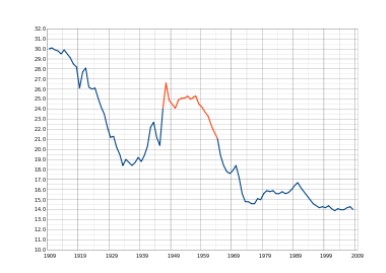Eritrea: The secrets Eritrea does not want to give up

Dictatorships and authoritarian systems share a common abhorrence for human rights and freedom expression. There are however those ruling countries with good economic performance and public services; Singapore and Chile under the former Pinochet are among the few that could be mentioned. Lately, Eritrea was lauded for achieving some of the United Nations’ Millennium Development Goals ahead of time. What explains its performances?
Baby boom
When wars end, soldiers come back home, marry and build families; resulting in “baby booms” and “marriage booms”. After the Second World War millions of American soldiers came back home and for the next 18 years; 2 babies out of every 100 women gave birth; almost 2 percent of the total population. The graph provided illustrates it powerfully. In comparison, the Soviet Union didn’t experience the same; due to the estimated 20 million soldiers and civilians killed in the war. The impact of this fertility decline is still felt in present day Russia.

The United States Census Bureau defined demographic birth
boom as between 1946 and 1964. Source: Wikipedia
When the Eritrean rebels took the country in 1991; they were estimated around 100 thousand; a significant percentage of whom were women. Did “baby boom” occur in Eritrea? I doubt it ever happened.
Certainly, there is no census made in the country. Twenty two years after it was recognized as a nation; despite the availability of a large manpower of the National Service recruits; the support of the United Nation offices; authorities didn’t have the political will to do it. Yet, this is a nation that often states, that people are its only human resources. A look at the factors that prevented this from occurring is essential.
According to the Demographic and Household Survey made in Eritrea, a dearth of people between ages of 20 to 49 was notable in the population pyramid. These people either became the casualties of the thirty year, or migrated to the Middle East and the West. As a result there have been untold number of spinsters in the land. Other factors were also present.
The National Service program was made by decree in 1994; which forced almost 10 thousand people (between the ages of 18 to 40) a year to the boot camps. The recruits were to train as soldiers and other services for the state for the duration of 18 months. When the second war with Ethiopia erupted again in 1998, almost all of the recruits were sent to front line with no hope of being disbanded. The war swallowed the lives of 20 thousand male and female soldiers. The effects of the national mobilization worsened the already adverse condition of the fertility rate. Although, the war ended in 2000; an estimated 300 thousand of young and aging soldiers have yet to return.
The material conditions of the married soldiers and the rest of the population were also dismal. The risk of women getting pregnant predictably drops. The destitute economic and political conditions understandably triggered the mass exodus of epic proportions to Sudan, Ethiopia and beyond. The males being the large majority of the women risking their lives to flee the country have left wives and spinsters to fend for themselves. Single-headed households become a permanent feature of the social landscape. In sum, the successive wars and huge migrations have affected the fertility rate of the country. [1]
According to the writer, Blanc AK, if demand hadn’t been reduced because of fertility decline; resulting in a “baby boom” scenario; health services in Eritrea would have been under challenge. The progress of the health indicators was seen with some reservation by the writer. The United Nations agencies and particularly the UNFPE, however, failed miserably in recognizing his hypothesis. Does the regime deserve all the accolades now? Certainly, not.
The reason many African countries have been performing poorly in the health sector is because of their high fertility and the youth bulge. Eritrea is allegedly doing better because it has likely not experienced “baby booms” and the “echo booms” which would have followed neither after 1991 nor after 2000. The “legacy” of the armed struggle is simply a propaganda going galore. What the UN missed, the camera crew of the BBC, which recently visited the country on the invitation of the regime also lost it. The BBC reporters did a good job, but failed in discovering “the secrets Eritrea does not want to give up.”
References
[1] Blanc AK. The Role of Conflict in the Rapid Fertility Decline in Eritrea and Prospects for the Future; Studies in Family Planning, Vol. 35, No. 4. Dec.2004, p.244.


![[AIM] Asmarino Independent Media](/images/logo/ailogo.png)